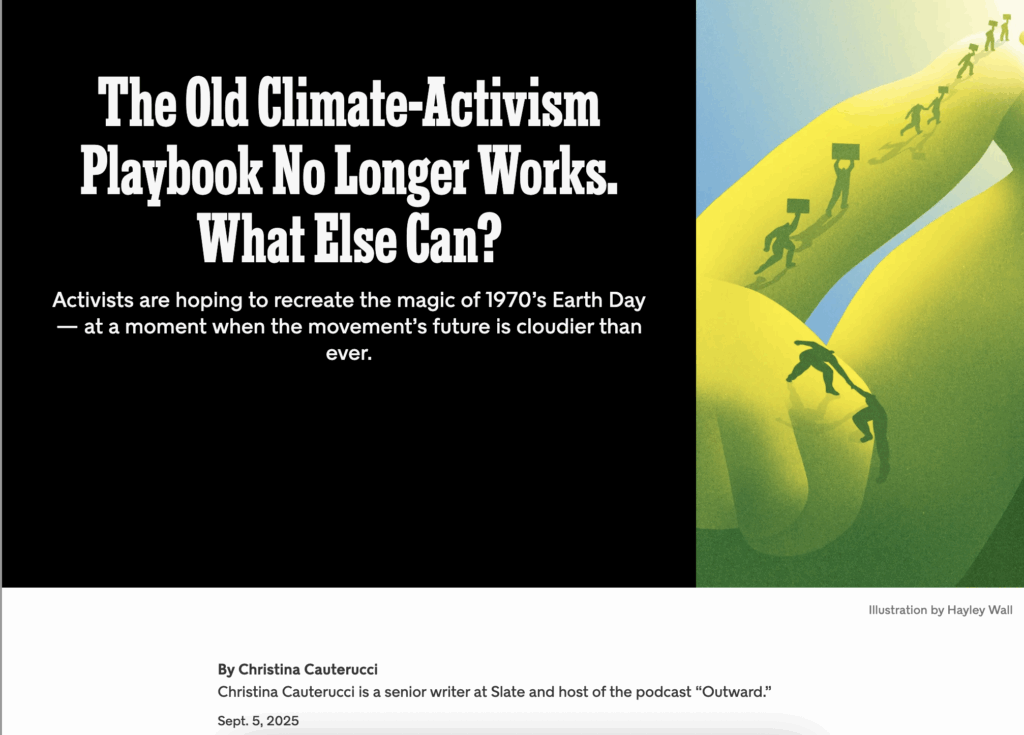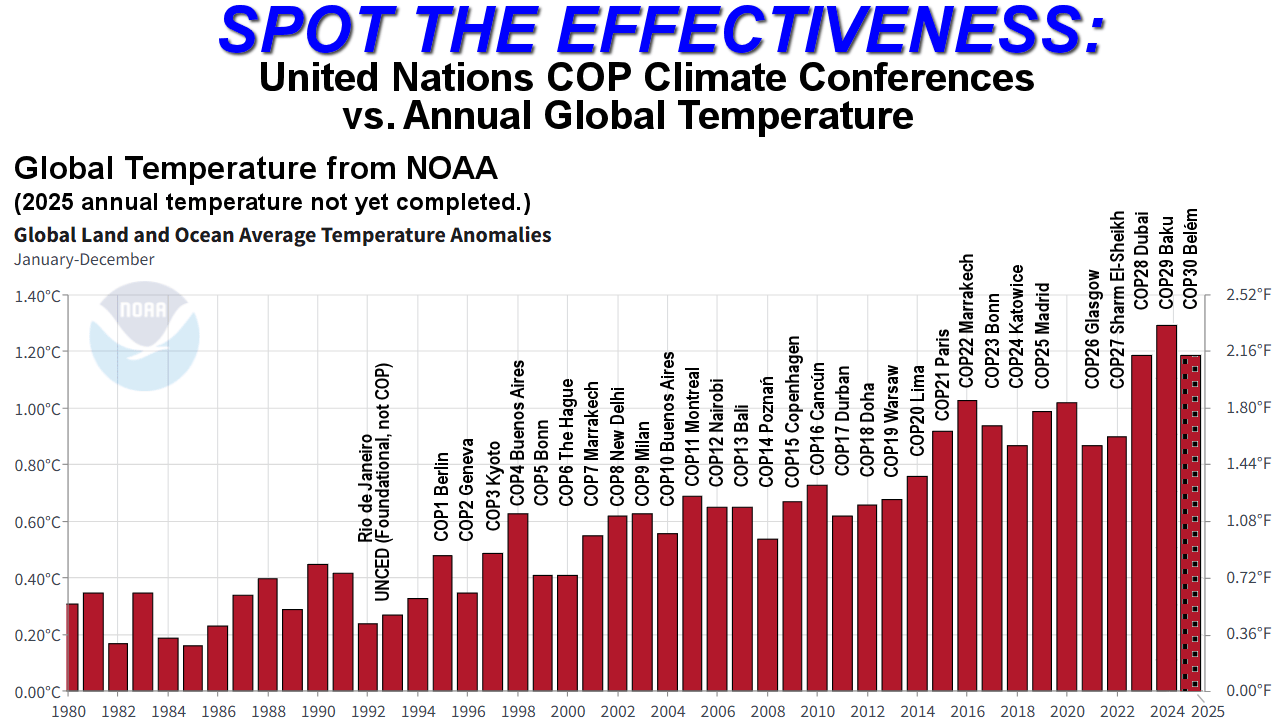https://archive.is/o8FaK#selection-1327.0-1327.401
The Old Climate-Activism Playbook No Longer Works. What Else Can?
Activists are hoping to recreate the magic of 1970’s Earth Day — at a moment when the movement’s future is cloudier than ever.
NYT Sept 5, 2025 excerpts: I met McKibben at a uniquely bleak time for that movement. Republicans in Congress had shredded the Inflation Reduction Act, a Biden administration law meant in part to lower greenhouse gas emissions, and President Trump was making every effort to thwart progress on renewables while boosting the oil-and-gas industry. The president had also pulled the United States out of the Paris Agreement, a climate accord that advocacy groups had helped catalyze. “In certain ways, it’s the darkest moment,” McKibben said.
…
But Sun Day also feels like a tactical swerve for McKibben. Climate activism over the past decade has been defined by global protests against fossil fuels, by Greta Thunberg’s student strikes, by the emergence of the Sunrise Movement. McKibben has been among the strongest exponents of that era’s climate-activism strategy — confrontational, morally stark, bent on shutting down economic activity that endangered humanity in the long-term even if it meant reducing corporate profits and curtailing Americans’ lifestyle options in the short term.
…
Now McKibben is taking a different tack, one that seems to share a message with a more moderate, adaptationist wing of the climate world while also harking back to the innocence and idealism of Earth Day. “This is clearly the thing that we can work on at the moment that stands a chance of making a difference,” he told me. His own shift in strategy comes as many activists are asking themselves some difficult questions: What has climate activism really given us? And where should it go from here?
“You can make a pretty decent case that everything that I’ve worked on in my entire professional life has gone down the toilet in the last six months,” said Denis Hayes, 81, a longtime environmental activist who was the lead organizer of the first Earth Day, when we spoke in July. Varshini Prakash, 32, a co-founder of the Sunrise Movement, told me that she once believed activists could pressure governments to make changes that might stop global warming outright. Now, she said, “I think that window has closed, and perhaps it never really existed.”
…
Ronald Reagan’s election in 1980 helped spur a new generation of environmental activists, McKibben among them. McKibben has written that, as a student at Harvard on election night, he “got grimly drunk,” spending the next day in bed before waking to write a Harvard Crimson essay about America’s turn away from moral responsibility and collectivist thinking. After graduation, McKibben became a staff writer at The New Yorker.
…
These were also the years when the Paris Agreement was adopted, propelled partly by activists from small island nations, and when Thunberg began skipping school on Fridays to protest for climate action. In the lead-up to the 2021 U.N. climate conference in Glasgow, the visibility of those demonstrations helped pressure dozens of banks to pledge to reach net-zero emissions across their investments by 2050. In those days, one could look around and easily believe that this brand of in-your-face climate activism might win the future — that activists could push people in power to keep fossil fuels in the ground.
But the breakthroughs didn’t last long. The problem wasn’t just Trump; over the past few years, climate has receded as a priority throughout the political and corporate worlds. “The banks and others who made commitments at Glasgow just turned out to be liars,” McKibben said. According to Luisa Neubauer, 29, a prominent activist who helped organize school strikes in Germany as a college student, momentum among young climate advocates petered out for several reasons, including the pandemic, the challenge of keeping students engaged after graduation and Israel’s war on Gaza, to which many activists — including Thunberg — turned their energy. “We were on the streets, hundreds of people, every Friday,” Neubauer said. “Were they seriously thinking that teenagers would do this for a decade?” On the weekend of Sun Day, she plans to join a series of demonstrations called Draw the Line, which 350.org helped organize. Though Neubauer will be focusing on clean energy, these protests illustrate the expanded range of priorities for young activists now: Draw the Line is pushing not just for a transition away from fossil fuels but for the redistribution of global wealth and an end to wars and genocide.
…
On the other ideological end of the climate movement, Ted Nordhaus, who runs the environmental think tank Breakthrough Institute, doesn’t believe the climate movement is capable of pivoting to economic practicality. He thinks that a fixation on solar and wind instead of, say, nuclear power is not a way to bring new people on board but “a rear-guard defense of, literally, ideological commitments that have defined this sort of underlying environmental view of energy since the mid-1970s.” Sun Day, in his view, “is a nostalgia for the old environmental politics that’s just dead.”
…
These two critiques from opposing directions capture a key tension within the climate movement. The activist, grass-roots side tends to want bold political action and a message that doesn’t sugarcoat or soften the threat of climate change. The other side wants political and economic realism and an end to so-called climate scaremongering. It’s hard not to wonder if catering to everyone is a near-impossible project, one that risks having a constituency of zero.
…
For all the work McKibben was putting into Sun Day, he’s not sure if it will continue beyond this year. If it does, someone else may have to lead it. “I’m getting old,” he told me. But he’s far from alone in trying to figure out a path for the climate movement. Neubauer told me that young activists have been asking her lately how they can recapture the excitement of the prepandemic student strikes.
…
…when asked to rank the issues that affect their votes, Americans regularly place climate near the bottom of the list.
…
What has climate activism really given us?
…
END NYT Excerpt



